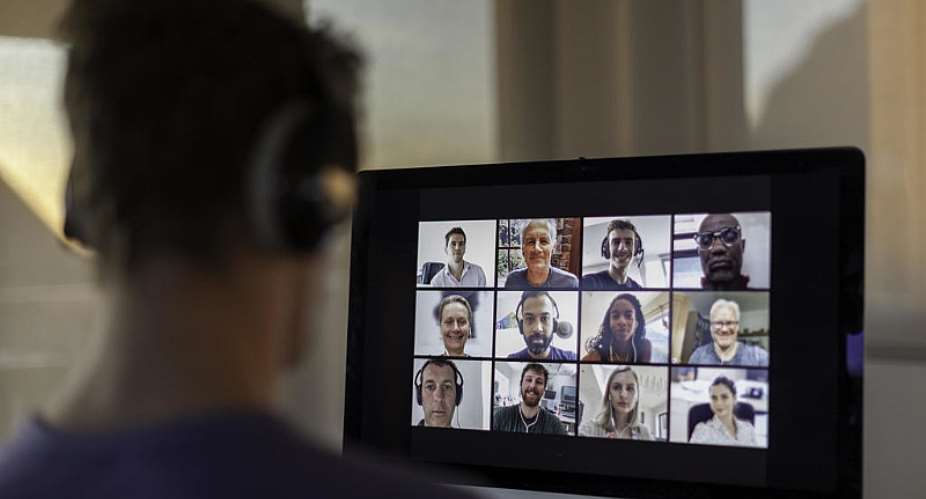French university teachers and directors have expressed concern over growing signs of psychological damage among their students, following the return to distance learning under the second Covid-19 lockdown.
Julie Groffe-Charrier is a lecturer in private law at the University Paris-Saclay in the south of the French capital where she normally teaches in lecture theatres to around 300 first-year students.
Since March, when the first Covid-19 lockdown was imposed, her students have only been physically present at her lectures for about one month.
In September, it was back to school as normal, albeit with lecture halls ventilated and social distancing measures imposed. Classes were divided in two, with one half of the students in attendance and the other half online, rotating every week.
But it only lasted until mid-October, with the second lockdown bring a return to full time distance learning.
"It's not so much the teachers – it's mainly the students that we're worried about," Groffe-Charrier tells RFI.
She and her colleagues have been receiving messages from many students who report a very precarious and isolated situation. Since September, she has received more than 30 emails, "not to mention the students who don't dare to express themselves".
"We might think that these students are all millennials so they live permanently on the internet – but that is false. There is a real digital divide.
"Some students have difficulty sending in their work because their network is bad. I also have students who have not been able to pay their internet bill because they have no money."
Broken social bond
A popular misconception is that students must all be happy to be able to stay home, says Groffe-Charrier. "In reality, we have more students who miss the lecture theatres and need contact with each other. The social bond is completely broken.
"When you live in a student dorm and you have a small job that's difficult to maintain, and you don't see anyone anymore, there is a real psychological impact on young people."
The issue of mental health among students, and more generally among young people, has not only been an issue since the beginning of the coronavirus epidemic.
According to the Confins study, which analyses the impact of the epidemic on young people, 28 percent of students say they are "sad, depressed or pessimistic more than half the time, or even every day".
Groffe-Charrier has no problems with the technical aspects of distance learning, but she misses the direct interaction with her students – and even just seeing them.
"When you have an auditorium in front of you and you can exchange spontaneously, when students come to you with questions after class, it's very different from teaching to a bunch of black boxes. Students don't turn on their cameras – which I can understand. But it changes the relationship with the teaching and the student."
Risk of dropping out
For some students, one benefit from classes going digital is that it removes a confidence barrier.
"Students who wouldn't dare to speak in front of 300 students in a lecture hall feel more comfortable it more by online chat."
But the positive is far outweighed by the negative – which also includes a heightened risk of dropping out and a shift in the selection process towards economic criteria, according to Groffe-Charrier.
"Between a student who has no financial problems, who is helped by his parents and has a pleasant living environment, and a student in a university dorm who can no longer afford to pay for his studies, the selection could be made on this basis in the long run.
"I refuse to accept the idea that one can select on financial criteria – even indirectly. The health aspect of the Covid-19 crisis is absolutely essential, but the economic and psychological impact on students must not be neglected."
French President Emmanuel Macron said in an interview with digital media outlet Brut that universities will likely be able to "partially" resume face-to-face classes a month earlier, at the beginning of January 2021, instead on 4 February as previously announced.





 This IMANI job no dey pap; the people you are fighting for are always fighting y...
This IMANI job no dey pap; the people you are fighting for are always fighting y...
 Prof. Naana Opoku-Agyemang has changed; you can see a certain sense of urgency –...
Prof. Naana Opoku-Agyemang has changed; you can see a certain sense of urgency –...
 MFWA Executive Director slams Akoma FM for engaging in ‘irresponsible’ media pra...
MFWA Executive Director slams Akoma FM for engaging in ‘irresponsible’ media pra...
 ‘Women must become millionaires too’ — Prof Jane Naana on establishment of Women...
‘Women must become millionaires too’ — Prof Jane Naana on establishment of Women...
 Some believe only in Ghanaian votes, not Ghana — Kofi Asare jabs politicians
Some believe only in Ghanaian votes, not Ghana — Kofi Asare jabs politicians
 Plan to make BEST sole aggregator of Sentuo Oil Refinery will create market chal...
Plan to make BEST sole aggregator of Sentuo Oil Refinery will create market chal...
 2024 elections: I can't have the man I removed from office as my successor — Aku...
2024 elections: I can't have the man I removed from office as my successor — Aku...
 2024 Elections: Immediate-past NPP Germany Branch Chairman garners massive votes...
2024 Elections: Immediate-past NPP Germany Branch Chairman garners massive votes...
 Gov’t focused on making Ghana energy self-sufficient, eco-friendly – Akufo-Addo
Gov’t focused on making Ghana energy self-sufficient, eco-friendly – Akufo-Addo
 April 25: Cedi sells at GHS13.74 to $1, GHS13.14 on BoG interbank
April 25: Cedi sells at GHS13.74 to $1, GHS13.14 on BoG interbank
